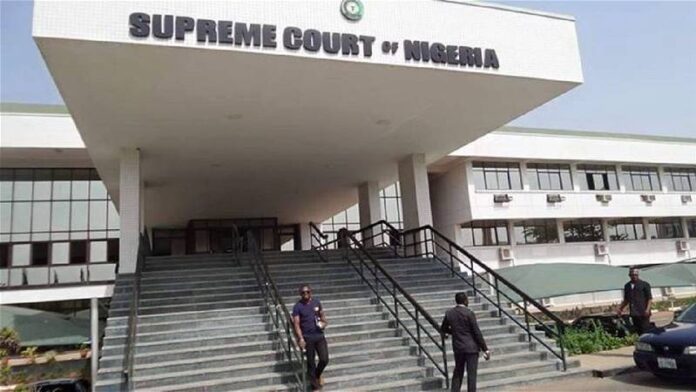Nowhere in the constitution does the Justice Minister possess powers to tamper with state or local government allocations
The Supreme Court is billed to sit on a constitutional question brought by the Osun state Government. The issue for determination is whether the Attorney General of the Federation has any power under the constitution to direct the withholding or the payment of a state or local government allocation under the Federation Account and Allocation Committee. The suit is about whether such powers exist within the mandate of the Justice minister and if the exercise of such power by the Attorney General of the Federation in the case of the seized Osun local government fund is not ultra vires and a direct breach of the constitution.
The Apex Court of the land is not for window dressing, legal gymnastics and merriment. It doesn’t fancy nor give room to the narrow compass of technical justice. Our Supreme Court is an undeniable authority which compels and commands obedience as a Court of policy, public interest and substantial justice.
The highest court in the land is known for its top-notch integrity and the high standard of my lord Justices sitting on the highly respected bench. My Lords are facing a major constitutional matter and there is no doubt they have the total view of the issue involved and it would therefore be a straight forward matter for them to decide.
In the case of Osun local government fund, the height of abuse of power was when the Minister of Justice directed his colleague, the Minister of Finance to withhold Osun state local government allocation. The second assumption of non-existing power was when the Justice minister further directed that the said fund be paid to particular set of politicians who have lost their mandates because their election was in violation of the Electoral Act as decided by a Federal High Court and affirmed by a Federal Court of Appeal.
The issue before the top court is not about who is the authentic elected chairmen and councillors of the local governments in Osun State.
That has been settled by the Federal High Court and the Court of Appeal which sacked the Yes/No chairmen of the APC, a decision which was confirmed by the Court of Appeal. The Court had unequivocally determined that the rightful occupants of the local government leadership are the PDP chairmen and councillors whose election comformed with the provisions of the Electoral Act. There is therefore no dispute before the law as to who is the authentic leadership of the local government in Osun State.
As the apex court sits on the matter of powers of the Justice Minister, it is instructive at this point to examine what powers the constitution allocates to the office of the Attorney General of the Federation and if he has exceeded those powers in the case of Osun state.
The Attorney-General of the Federation has the responsibility to advise the Federal Government appropriately that the current judgment which is against the Yes/No APC council officials is bound to be obeyed and should be implemented without delay. However, the AG has allowed his political affiliation to becloud his professional ethics
The office of the Attorney-General of the Federation is established under section 150(1) of the 1999 Constitution (as amended). It provides that: “There shall be an Attorney-General of the Federation who shall be the Chief Law Officer of the Federation and a Minister of the Government of the Federation. By this provision, the AGF serves a dual role:
1. As the Chief Law Officer of the Federation, he is the principal legal Adviser to the federal government.
2. As a Minister of the Government, he is a political appointee, serving as part of the Federal Executive Council.
The powers of the AGF are principally derived from section 174 of the Constitution of the Federal Republic of Nigeria 1999 (as amended) i.e the power to institute criminal proceedings, to take over criminal proceedings instituted by any other person under his fiat and to discontinue criminal proceedings at any stage before judgment is delivered.
However, despite this enormous power, the Constitution further requires that, in exercising these powers, the Attorney-General must have regard to public interest, the interest of justice and the need to prevent abuse of power.
The AGF is only an Officer of one of the three levels of government involved in FAAC, that is the Federal government. He does not represent the 36 states and the 774 local governments. He lacks the power to assume the functions of FAAC or that of a court of law. His action is a manifestation of impunity, an affront on existing court judgements and a breach of the rule of law
The above powers only applicable to criminal matters not civil matters, the AGF lacks such powers in civil matters such as dispute between a state and federal government, matters involving one agency of government against another and suit between a state government and local government.
Nowhere in the constitution does the Justice Minister possess powers to tamper with state or local government allocations. Only a court of law can stop a state or local government allocations. Once the FAAC determines the Federation sharing formula, only a competent court can decide to halt or tamper with the disbursement process.
The AGF is only an Officer of one of the three levels of government involved in FAAC, that is the Federal government. He does not represent the 36 states and the 774 local governments. He lacks the power to assume the functions of FAAC or that of a court of law. His action is a manifestation of impunity, an affront on existing court judgements and a breach of the rule of law.
If the AGF is to claim to be enforcing the Supreme Court judgement on local government fund that affects all States of the Federation, he again acted outside his powers for several reasons. The implementation was put on hold to sort out operational questions by a government in which the AGF is the Chief Law Officer. Secondly, the AGF acted against the law by selecting only one state to illegally apply the ruling. Thirdly, he ordered payment into an account opened by politicians without mandates and who are not official signatories to local government accounts.
The AGF has no powers no manage or control local governments in Osun state or Nigeria as a whole. The control of Local Government finance is vested in section 7 of the Constitution of Federal Republic of Nigeria. The 1999 as amended is still in force. It has not been suspended. It remains the ground norm under which Nigeria operates.
Supreme Court July 2024 ruling on local government Autonomy did not suspend the provision of this section of the Constitution. Section 7 (1) provides that: ” The system of local government by democratically elected local government councils is under this constitution guaranteed; and accordingly, the Government of every State shall subject to section 8 of this constitution, ensure their existence under a Law which provides for the establishment, structure, composition, FINANCE, and functions of such councils.”
In the same vein, section 7(6) also clothed the House of Assembly of States with power over statutory allocations, it says “the House of Assembly of a State shall make provisions for statutory allocation of public revenue to local government councils within the State. Those provisions subsistence and the AGF cannot by any stretch of imagination assumes powers not allocated to his office.
When and if my lord Justices at the Supreme Court acetone decide, validated grounds exist to prove that the AGF acted ultra vire his powers. His actions are illegal and a violation of the constitution.
On the wider issue, the AGF cannot claim to be protecting council chairmen validly sacked by a court of law.
A quick backgrounder is necessary on this matter. On August 8, 2022, the All Progressive Congress (APC)-led government in Osun State after losing the governorship election of July 16 2022 to PDP issued a notice to conduct local government election. This “Jankara Notice” was in contravention of mandatory 360 days notice stipulated under Electoral Act 2022 and Osun State Independent Electoral Laws.
As a result of this contravention of the law by APC led government under the leadership of Alhaji Gboyega Oyetola who conducted an election with less three months notice, the PDP and Action Peoples Party (APP) approached the Federal High Court separately to challenge the validity of the Local Government election which held on October 15, 2022.
On November 25, 2022, Justice Nathaniel Ayo-Emmanuel gave judgment in the PDP suit and invalidated the October 15, 2022 election and as a consequence, sacked all beneficiaries which are APC members.
By November 30, the same judge decided the APP suit, nullifying the October 15, 2022 local government election. Now, two separate judgments against APC Yes/No election conducted on 15th October 2022.
The APC filed separate appeals against the two judgments. On February 10, 2025, the Court of Appeal sitting in Akure decided the Appeal filed against the judgment delivered on November 25, 2022 and ruled that the PDP suit was filed prematurely without pronouncing on the legality of the election.
Similarly, the APC returned to Court of Appeal to attempt the relisting of its appeal against the judgment secured by the APP after months of abandonment but on June 13, 2025, the court refused the request and affirmed the previous decision which nullified the October 15, 2022 local governments election and affirmed the election of PDP new chairmen and councillors whose have since assumed offices.
Notwithstanding this legal situation, the APC continues to ignore it and continue to lay claim to the councils even when there is a subsisting judgment that sacked its officials. It is elementary law that where there are two conflicting judgments, parties are bound by the current one.
The Attorney-General of the Federation has the responsibility to advise the Federal Government appropriately that the current judgment which is against the Yes/No APC council officials is bound to be obeyed and should be implemented without delay. However, the AG has allowed his political affiliation to becloud his professional ethics.
It is germane to remind the AG that legal Profession is highly regulated and his political affiliation has led him to commission of infractions against the legal ethics. Rule 1 of Rules of Professional Conduct (RPC) for legal practitioners 2023 states as follows: ” A lawyer shall uphold and observe the Rule of Law, Promote and Foster the Course of Justice, maintain a high standard of professional conduct, and shall not engage in any conduct which is unbecoming of a legal practitioner”.
In addition, the AG as number 1 officer Law Officer of the Federation is duty bound to act within the bound of law. Despite a subsisting Appeal Court judgment sacking the Yes/No APC Chairmen, the AG in disregard to any extant law ordered the release of local government allocation to private accounts opened by COURT-SACKED Yes/No APC Chairmen. This is in contravention of Rule 15 of Rules of Professional Conduct 2023 that provides: “In his representation of his employer, a lawyer shall:
(a) Keep strictly within the law notwithstanding any contrary instruction by his employer, where the lawyer insists on a breach of law, the lawyer shall withdraw his service and;
(b) Use his best endeavours to restrain and prevent his employer from commiting misconduct or breach of the law… and if his employer persist in his action or conduct, the lawyer shall terminate their relations”.
From every known law in Nigeria, either by statutes or case law, the Attorney-General of the Federation lacks power to order payment of statutory allocation into the account of Yes/No illegal account. The act of the AG is likened to Infamous Conduct in Professional respect which attract sanction if place before Legal Practitioner Disciplinary Committee.










